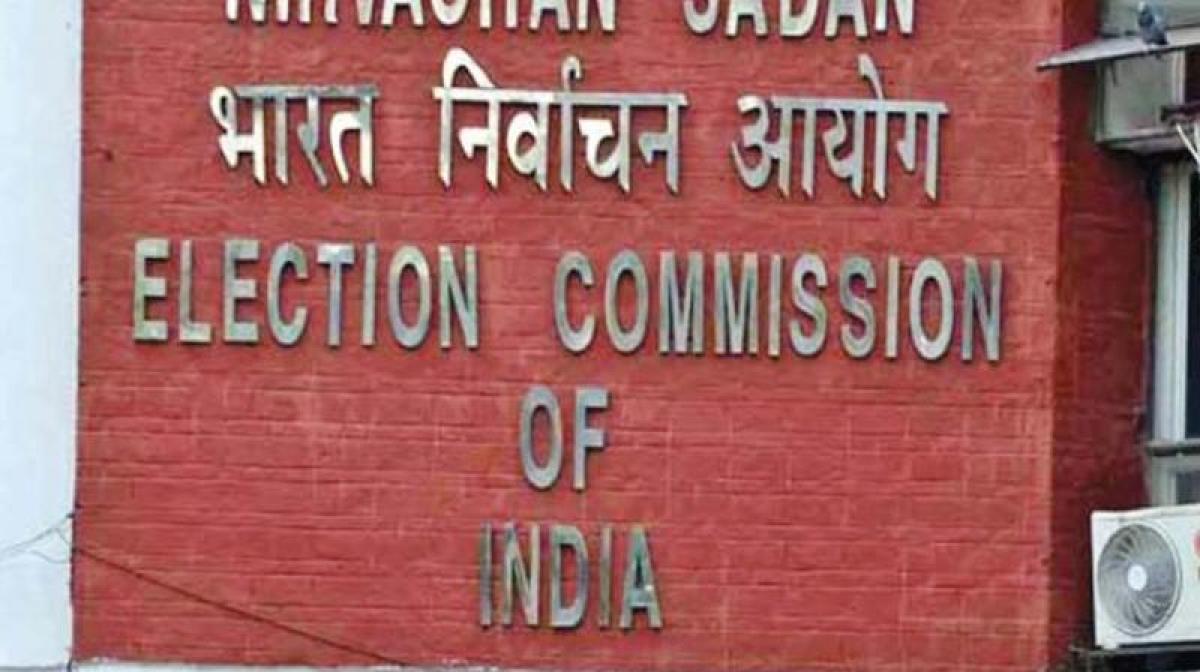Live
- Trailblazing Yakshagana Artiste Leelavathi Baipaditthaya No More
- Cong in direct fight with BJP on 45-50 seats in Delhi Assembly election: Sandeep Dikshit
- Vijay Diwas: Assam Rifles organises Half Marathon in Tripura
- Delhi HC to hear on Monday plea against suppression of CAG reports by CM Atishi
- Collaboration, innovation, PPP key to achieve 2047 goals: Jitendra Singh
- Portraits of National Leaders to be Unveiled in Karnataka Assembly Hall
- Kejriwal's claims on vision for development ridiculous: Delhi BJP
- One nation, one election need of the hour: Mukhtar Abbas Naqvi
- Educational Trips in South Kanara Put on Hold Following Murudeshwar Drowning Incident
- Karnataka Temple Embraces Mechanical Elephant for Cruelty-Free Ceremonies
Just In

The Election Commission on Wednesday launched a web-based application, Electoral Registration Officer (ERO) network, aimed at efficient conduct of elections and said it would be \"logistically equipped\" by September 2018 to hold simultaneous polls for Lok Sabha and assemblies.
The Election Commission on Wednesday launched a web-based application, Electoral Registration Officer (ERO) network, aimed at efficient conduct of elections and said it would be "logistically equipped" by September 2018 to hold simultaneous polls for Lok Sabha and assemblies.
The announcement by the poll panel came days after it issued a formal direction that VVPAT (Voter Verifiable Paper Audit Trail) machines will be used at polling stations in all future elections where polls are held using EVMs.
"The Election Commission was asked by the Centre as what it would require for becoming capable of holding the parliamentary and assembly polls together. In response, the EC had asked for funds to purchase new EVMs and VVPAT machines. The commission would be logistically equipped by September, 2018, to hold parliamentary and assembly polls together," Election Commissioner O P Rawat told a press conference.
At the presser, the poll watchdog unveiled the Electoral Registration Officer (ERO) network.
Rawat said the commission has already placed the order for the purchase of new EVMs and VVPAT machines after receiving funds from the Centre.
He said the poll body would get 40 lakh VVPAT machines by September 2018.
VVPAT is a machine which dispenses a slip with the symbol of the party for which a person has voted for. The slip drops in a box but the voter cannot take it home. It has only been used on trial basis in some places.
Several parties have been pressing for the use of these machines to dispel doubts about EVM tampering. Sixteen parties had recently petitioned the EC to revert to paper ballot system for greater transparency. The Bahujan Samaj Party (BSP), the Aam Aadmi Party (AAP) and the Congress had attacked the EC on the issue of alleged tampering of EVMs.
Responding to a query, Rawat said the EC had received Rs 3,400 crore for VVPAT machines and Rs 12,000 crore for EVMs.
"We would be logistically ready to hold simultaneous polls by September 2018, but it is up to the government to take a decision and make necessary legal amendments for it," the election commissioner said.
Rawat said the officers involved in the poll process, right from the booth level to the national level, would be connected through the ERO network. Besides, the facility can also be used for online registration by voters.
"ERO network would automatically detect duplicate registration of voters. Besides, officers from the booth level to the national level would be under one network and would be able to communicate with each other," he said.
Explaining the utility of the app, he said the ERO network would effectively keep a check on duplication.
"At times, voters migrate and get themselves registered at new places. However, they fail to get their name deleted from the previous place, which results in duplication," he added.
Rawat said an error-free electoral roll is the basis for conducting a smooth, free and fair election.
He informed that the poll panel had carried out the "electoral roll purification process" earlier and deleted duplicate registrations of voters.
"ERO would make this work more easy," he said.
When asked about the feasibility of an e-voting facility in future, Rawat said, "This (ERO) and the electronically transmitted postal ballot for service voters are the first and second steps towards it (e-voting)".
Rawat said they had used VVPAT machines in all the recent elections on the directive of the Supreme Court.

© 2024 Hyderabad Media House Limited/The Hans India. All rights reserved. Powered by hocalwire.com







